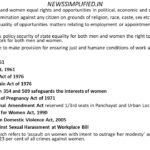MP expelled from Lok Sabha: Basics Explained

Mahua Moitra, Member of Parliament (MP), from West Bengal, was expelled as an MP following a voice vote on Friday in Lok Sabha. A motion to expel was passed by voice vote for “unethical conduct” as the Ethics Committee report on ‘cash-for-query’ allegations was tabled in the House.
LEARNING FROM HOME/ WITHOUT CLASSES/ BASICS
The Parliament has the right to punish its members for their misconduct in the House or outside. In cases of misconduct or contempt committed by the members, the House can punish in the form of admonition, reprimand, withdrawal from the House, suspension from the service of the House, imprisonment, and expulsion from the House.
Provision for suspension of members is given in Rule 374 and Rule 374A of the Lok Sabha Rules for the Lok Sabha and Rule 256 of the Rajya Sabha.
Rule Number 373 says, “The Speaker if he is of the opinion that the conduct of any Member is grossly disorderly, may direct such Member to withdraw immediately from the House.
Rule 374 suspension of a Member:
(1) The Speaker, may, if he deems it necessary, name a member who disregards the authority of the Chair or abuses the rules of the House by persistently and wilfully obstructing the business thereof. If a member is so named by the Speaker, the Speaker shall, on a motion being made forthwith put the question that the member (naming such member) be suspended from the service of the House for a period not exceeding the remainder of the session.
Articles 105 and 194 of the Constitution deal with Privileges. (1) Subject to the provisions of this Constitution and the rules and standing orders regulating the procedure of Parliament, there shall be freedom of speech in Parliament.
These Articles maintain that the rules and Regulations which would govern the privileges (including breach of such privilege) shall be determined by Parliament which still are not defined by the Parliament yet. Articles 105 (3) and Articles 101 and 102, and should proceed to define its privileges as contemplated by Article 105 (3).
Article 122 of the Indian The Constitution says “The validity of any proceedings in Parliament shall not be called (into) question on the ground of any alleged irregularity of procedure”.
It also specifies that “no officer or Member of Parliament in whom powers are vested by or under this Constitution for regulating procedure or the conduct of business, or for maintaining order, in Parliament shall be subject to the jurisdiction of any court in respect of the exercise by him of those powers”.
The Supreme Court (SC) of India while upholding the Parliament’s power to expel the members involved in cash for query scam, the Apex Court held that the power of expulsion can be claimed by Indian legislatures as one of the privileges inherited from the British House of Commons through articles 105(3) and 194(3) of the Constitution.
In the 2007 Raja Ram Pal case the SC said that “ There may be other cases where judicial review may be necessary.” “The proceedings which may be tainted on account of substantial or gross illegality or unconstitutionality are not protected from judicial scrutiny”.
Article 102 laid down the disqualification relating to the membership of both houses of Parliament. Article 191 of the Constitution of India mentioned the criteria for disqualification from membership of a state legislature. ART 191: if he holds any office of profit under the Government of India or the Government of any State specified in the First Schedule, other than an office declared by the Legislature of the State by law not to disqualify its holder; b) if he is of unsound mind and stands so declared by a competent court; c) if he is an undischarged insolvent. d) if he is not a citizen of India, or has voluntarily acquired the citizenship of a foreign State, or is under any acknowledgment of allegiance or adherence to a foreign State; e) if he is so disqualified by or under any law made by Parliament. (2) A person shall be disqualified for being a member of the Legislative Assembly or Legislative Council of a State if he is so disqualified under the Tenth Schedule. Section 8 of the Representation of the People Act (RP Act) deals with disqualification on conviction for certain offenses. A person convicted of any offense and sentenced to imprisonment for varying terms under Sections 8 (1) (2) and (3) shall be disqualified from the date of conviction and shall be disqualified for a further period of six years since his release. However, Section 8 (4) of the RP Act gave protection to MPs and MLAs they could continue in office even after conviction if an appeal is filed within three months.





0 Comments